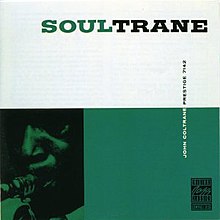Soultrane
Soultrane
1958 studio album by John Coltrane
Soultrane is the fourth studio album by jazz musician John Coltrane, released in 1958 on Prestige Records, catalogue 7142. It was recorded at the studio of Rudy Van Gelder in Hackensack, New Jersey, three days after a Columbia Records session for Miles Davis and the Milestones album.
| Soultrane | ||||
|---|---|---|---|---|
 | ||||
| Studio album by | ||||
| Released | Mid October 1958[1] | |||
| Recorded | February 7, 1958 | |||
| Studio | Van Gelder Studio Hackensack, New Jersey | |||
| Genre | ||||
| Length | 39:56 | |||
| Label | Prestige | |||
| Producer | Bob Weinstock | |||
| John Coltrane chronology | ||||
| ||||
| Review scores | |
|---|---|
| Source | Rating |
| AllMusic | |
| The Encyclopedia of Popular Music | |
| Tom Hull | A−[4] |
| The Penguin Guide to Jazz | |
| The Rolling Stone Jazz Record Guide | |
The album is a showcase for Coltrane's late-1950s "sheets of sound" style, the term itself coined by critic Ira Gitler in the album's liner notes. Also featured is a long reading of Billy Eckstine's ballad standard "I Want to Talk About You", which Coltrane would revisit often, including a version on the album Live at Birdland. Among the other tracks are "Good Bait" by Tadd Dameron, and Fred Lacey's "Theme for Ernie". "You Say You Care" is from the Broadway production of Gentlemen Prefer Blondes.
The album closes with a frenetic version of Irving Berlin's "Russian Lullaby". Producer Bob Weinstock relates Coltrane's humorous interpretation:
- We were doing a session and we were hung for a tune and I said, "Trane, why don't you think up some old standard?" He said, "OK I got it.["]...and they played "Russian Lullaby" at a real fast tempo. At the end I asked, "Trane, what was the name of that tune?" And he said, "Rushin' Lullaby". I cracked up.[7]
Soultrane takes its title from a song on a 1956 album by Tadd Dameron featuring Coltrane, Mating Call. "Soultrane" does not appear on this Soultrane, and none of the five tunes on Soultrane is an original by Coltrane. The song "Theme for Ernie" was featured on the soundtrack for the 2005 film Hollywoodland.
| No. | Title | Writer(s) | Length |
|---|---|---|---|
| 1. | "Good Bait" | 12:08 | |
| 2. | "I Want to Talk about You" | Billy Eckstine | 10:53 |
| Total length: | 23:01 | ||
| No. | Title | Writer(s) | Length |
|---|---|---|---|
| 1. | "You Say You Care" | 6:16 | |
| 2. | "Theme for Ernie" | Fred Lacey | 4:57 |
| 3. | "Russian Lullaby" | Irving Berlin | 5:33 |
| Total length: | 16:46 | ||
Production
- Rudy Van Gelder – engineering, remastering
- Shigeo Miyamoto – engineering, mastering
- Alan Yoshida, Steve Hoffman – mastering
- Del Costello, Bob Weinstock – production
- Kazue Sugimoto – supervision
- Akira Taguchi – supervision
- Ira Gitler – liner notes
- Larkin, Colin (2007). The Encyclopedia of Popular Music (4th ed.). Oxford University Press. ISBN 978-0195313734.
- Hull, Tom (n.d.). "Essential Jazz Albums of the 1950s". tomhull.com. Retrieved March 12, 2020.
- Cook, Richard; Morton, Brian (2008). The Penguin Guide to Jazz Recordings (9th ed.). Penguin. p. 285. ISBN 978-0-141-03401-0.
- Swenson, J., ed. (1985). The Rolling Stone Jazz Record Guide. USA: Random House/Rolling Stone. p. 48. ISBN 0-394-72643-X.
- Porter, Lewis (1999). "John Coltrane: His Life and Music". Ann Arbor: The University of Michigan Press. p. 253. ISBN 0-472-10161-7.